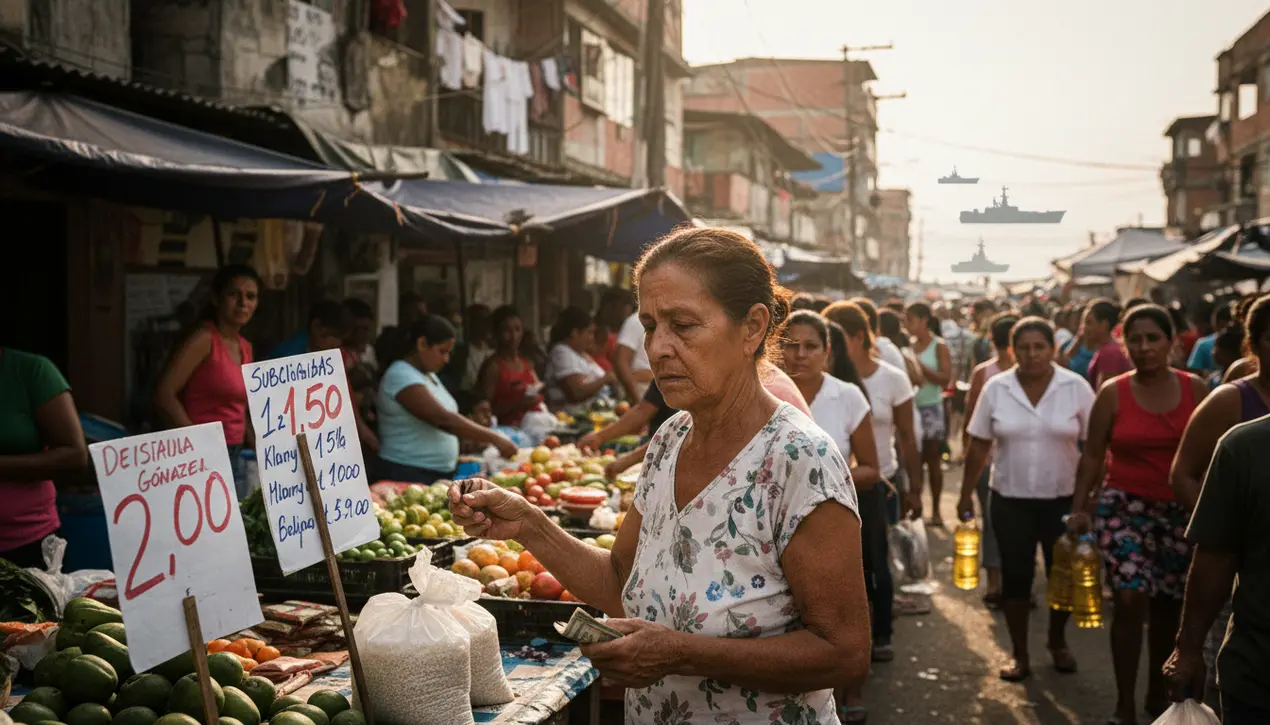
Politicsconflict & defenseMilitary Operations
Venezuelans prioritize food prices over US military threat.
EM
Emma Wilson
12 hours ago7 min read
The rattle of sabers from the north echoes across the Caribbean, a distant, abstract threat that fails to stir the people of Caracas from their primary, gut-wrenching battle: the one waged in the aisles of their local markets. While U.S. naval assets maneuver in nearby waters, escalating a geopolitical standoff that captures international headlines, the true enemy for the average Venezuelan is not a foreign fleet but the relentless, suffocating climb of numbers on a price tag.This is a nation living a profound duality, where the macro-level drama of military posturing is utterly drowned out by the micro-level agony of survival economics. In the Petare barrio, María González, a 54-year-old grandmother, doesn't glance at news reports about fleet movements; her entire focus is on the ever-shrinking pile of bolivars in her palm and the impossible arithmetic of converting them into a week’s worth of food for her family.'They talk about invasions and threats,' she says, her voice weary with a decade of crisis, 'but the invasion we live with every day is hunger. It’s the silent soldier that has already taken our country.' This sentiment is the national pulse, a collective exhaustion from a population that has endured one of the most severe hyperinflation episodes in modern history, a trauma that has reshaped its psyche and priorities. The U.S. military threat, while significant for the Maduro government and its allies in Moscow and Beijing, is perceived by the masses as just another chapter in a long, external pressure campaign.The immediate, tangible crisis is the 400% annual food inflation that renders a monthly salary worthless within days, forcing families into brutal trade-offs between medicine, school supplies, and nutrition. The background to this lies in the catastrophic collapse of the Venezuelan oil industry, the lifeblood of its economy, compounded by years of crippling U.S. sanctions aimed at ousting Maduro but which critics argue have disproportionately punished the most vulnerable.The result is a humanitarian catastrophe where, according to a recent UN report, over half the population lives in poverty, with child malnutrition rates soaring. The geopolitical theater plays out against this grim reality.Washington’s maneuvers are a calculated signal to Caracas, a reminder of its hemispheric dominance, but for the woman standing in a queue for subsidized cooking oil that may run out before she reaches the front, it is meaningless noise. The real war is here, in the empty shelves, the closed factories, and the exodus of over seven million citizens—a refugee crisis second only to Syria’s.The consequences of this disconnect are dire. It fuels a deep-seated public cynicism toward all forms of authority, both domestic and international.It creates a vacuum where extremist solutions can fester and where the basic social contract is irrevocably broken. As one local economist, Professor Carlos García, notes from his office at the Central University of Venezuela, 'When a government cannot provide food security, it loses its fundamental legitimacy.External threats become a convenient distraction, but the people are not distracted. They are hungry, and hunger is a more potent political force than any battleship. ' The world watches the military chess game, but the real story, the human story, is unfolding in the quiet desperation of a kitchen with no food.
#Venezuela
#US military threat
#food prices
#economic crisis
#sanctions
#featured
Stay Informed. Act Smarter.
Get weekly highlights, major headlines, and expert insights — then put your knowledge to work in our live prediction markets.
Comments
Loading comments...
© 2025 Outpoll Service LTD. All rights reserved.